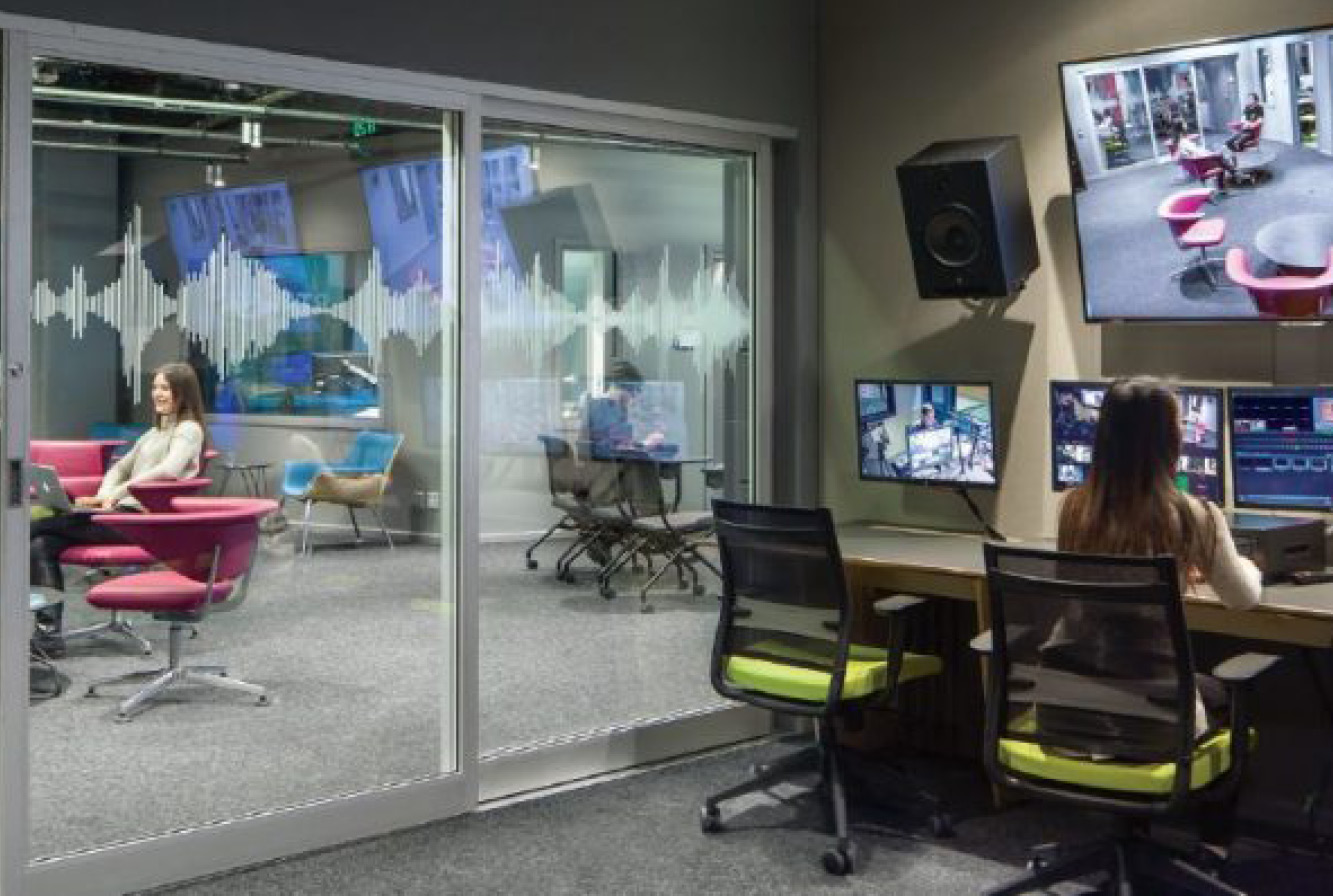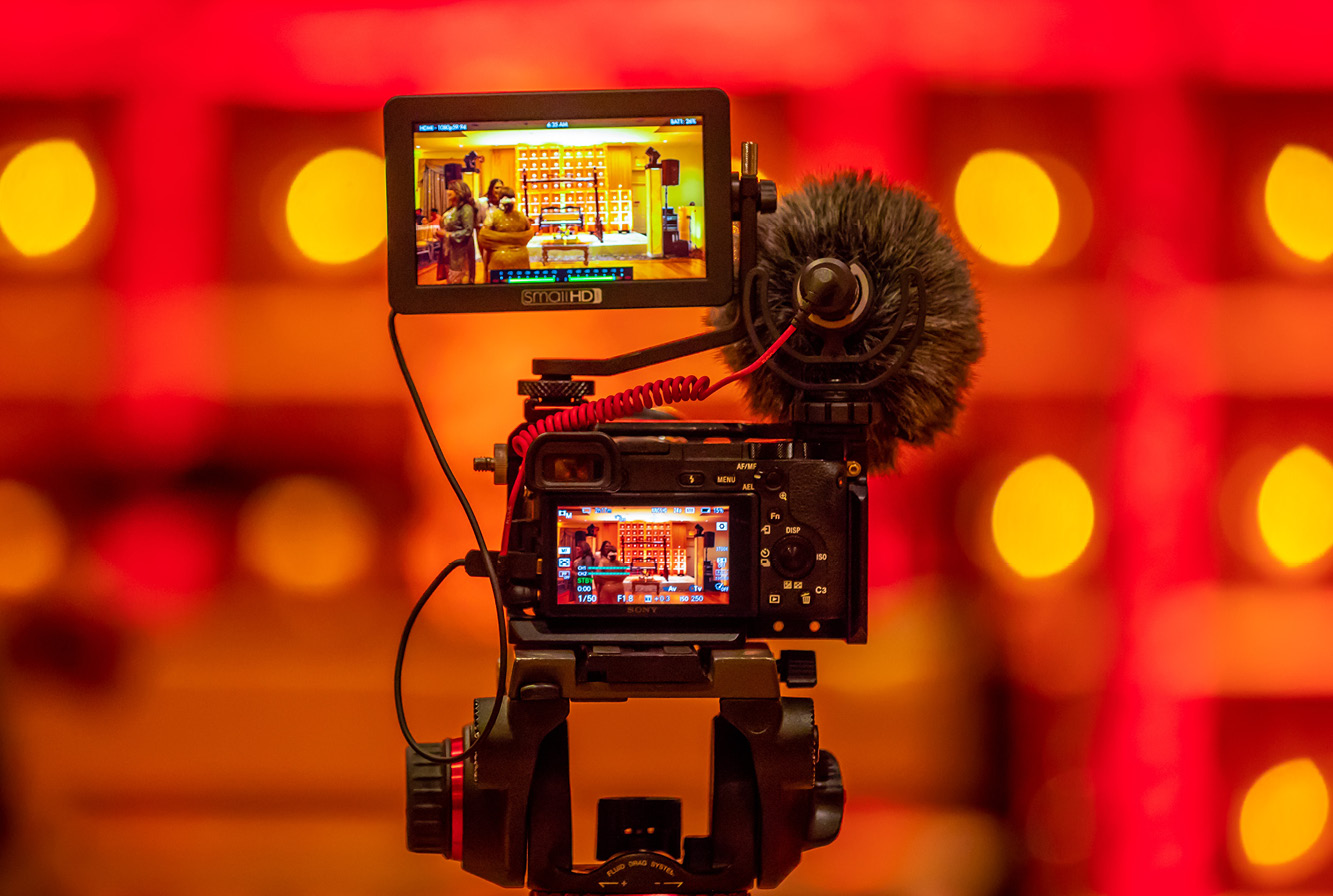Centres & Labs
Centres & Labs

The Allan Slaight Radio Institute provides access to new studios equipped with state-of-the-art technology and software and offers mentorship and radio-and-sound curriculum encouraging students to push boundaries, innovate, and disrupt in all areas of radio—from production and content to management and distribution. Each year we engage the broadcast community in a variety of stimulating presentations, knowledge translation activities and professional development initiatives aimed at enhancing the Canadian Radio industry.

A research group that investigates contemporary media consumption and user/audience experiences, in particular in emerging areas of digital communication and human-computer interactions. Recent or current projects include research on adoption of smart speakers, audiences for explanatory journalism, and mediatization of micro firms.
 (opens in new window)
(opens in new window)
FDSC supports research and knowledge exchange that cultivates inclusion, equity and decolonization in the field of Fashion Studies and the fashion system more broadly. Our work centres fat, disabled, trans, gender non-conforming, Indigenous, Black, racialized and/or other bodies that have been marginalized in and by fashion. Our projects use participatory and decolonizing methodologies to centre the experiences and ideal futures of these wearers and makers and to redesign the field of fashion for and with them.

The Centre for Free Expression focuses on issues related to freedom of expression and the public’s right to know. This includes campus free expression, academic freedom, hate speech, censorship, disinformation, access-to-information, whistleblower protection, anti-SLAPP legislation, corporate and government surveillance, and freedom of the press.

Colour Media Lab pioneers an interdisciplinary approach to analyzing color in modern culture and media. We combine research from the history of technology; media and communications; and aesthetics to reframe traditional disciplinary attitudes. By placing color at the center of our analyses, we generate original and cutting edge insight primed for global dissemination. Current topics of interest include: synthetic color, electronic media and screen culture, urban aesthetics, architecture, fashion, textiles, and pattern.

The Creative Communities in Collaboration research lab (CCC) investigates how creativity and cultural production enable resilience and strength in communities. Not only a driver of 21st century economies, culture and creative expression also enhance the wellbeing of individuals and communities. The CCC examines emergent and community-based responses to social, economic, political, and cultural problems.

Founded by David Gauntlett, The Creative School’s Tier I Canada Research Chair in Creative Innovation and Leadership, Creativity Everything takes a deliberately broad and inclusive approach to creativity, connecting ideas from a range of disciplines, and seeking to embrace a diverse range of creators and creative practices. This includes three core themes: a) Exploring how best to support the development and exchange of ideas and innovation; b) Researching new and diverse models of leadership and inspiration; c) Developing new ways of engaging wider audiences with these issues.

A technology-based workshop that supports creative research, curriculum, and entrepreneurship activities across all programs and zones at The Creative School. The lab looks to disrupt and revolutionize the use of technology within the creative fields by leveraging digital fabrication, 3D printing, textile computing, AR/VR, and robotics.

The DMRC focuses on documentary as the “creative treatment of actuality”, as John Grierson defined it, with an emphasis on the two terms: “creative” meaning current, multidisciplinary and multiplatform forms of representation and “actuality” as a reference to subject matter that is discovered in the situated conditions of the world. We foster research and creative activity across a diverse range of media, including film, photography and new media.

The Experiential Media Institute (XMI) develops new insights, analysis, models, and practices for understanding mediated experience design across industries, technologies, production modes, and content strategies. XMI explores the opportunities offered by the convergence of media practices in four target areas: content creation, audience relationships, emergent business models, and the applications of media in disparate industries.

In partnership with Cirque du Soleil, the largest theatrical producer in the world, FOLiE conducts boundary-pushing research into the future of live entertainment. Through a distinctively interdisciplinary approach at the crossroads of technology and creativity, the lab tackles questions of how changes in audience preferences, emerging technologies and shifting economic conditions are creating new possibilities for live entertainment, as well as potential for social, educational, and commercial impact.

The GCGL supports academic research on key questions related to the structure and governance of communication industries and aims to provide a platform for developing and sharing knowledge and expertise. It provides learning opportunities and physical space for certain dynamic Toronto Met students to contribute to professional scholarly research.

The GXS Lab is the connection between scholarly research and industry practice in sport and sport media. GXS focuses on the intersection and knowledge transfer between Globalization; Digitization; and Commercialization to create new opportunities in sport and sport media interdisciplinary research design and experience.
 (external link)
(external link)
The Infoscape Research Lab hosts research projects that focus on the cultural and political impact of digital media, particularly with regards to social media. The lab develops collaborative software based research tools and experimental research methods that seek to analyze content and use of new media platforms.The lab also supports research creation projects, including but not limited to documentary film.

This is a period of dramatic upheaval, excitement and uncertainty for journalism and journalists. At the Journalism Research Centre, we examine the impact of these changes, and study trends in journalism and what they mean for society and the news business. We also explore the impact of technological innovation and encourage the development of new tools for producing great stories.
 (external link, opens in new window)
(external link, opens in new window)
A globally recognized lab for spearheading innovative research and education in Digital Asset Management and fostering partnerships with organizations nationally and internationally across diverse sectors.

The Graphic Communications industry is constantly impacted by the advent of new forms of media and communications technologies. The PMRC capitalizes on the infancy of many of these innovations and provides the industry a much-needed objective base for research and development on new, emerging, and future technologies and trends. The PMRC works closely with industry partners to help them achieve their research goals.
 (opens in new window)
(opens in new window)
A transdisciplinary Indigenous centre for research and creation launched by The Creative School in 2017. Named after the Anishinaabe word for the emerging light of dawn, Saagajiwe’s mission is to facilitate the dissemination of Indigenous thought and culture. In addition to research, priorities include Indigenous creative expression, interdisciplinary curriculum development and creative spaces on campus.

Stitched! is a research and production lab focused on the development and expansion of live journalism models. At stitched! we respond to multiple challenges the journalism industry faces, including exploring new ways to present reported stories, building trust and engagement with audiences, exploring interactivity and applying practices from complimentary fields including - but not limited to -the field of documentary and verbatim theatre.
 (external link)
(external link)
A laboratory that brings together students, staff and faculty, as well as, artists, activists, and media scholars from across the GTA and beyond to mobilize knowledge across the city on topics related to media activism and its role within a society. This includes organizing a yearly roster of symposia, speakers’ series, workshops, and student/faculty research creation outputs.
 (external link)
(external link)
The Synaesthetic Media Lab (Synlab) at Toronto Metropolitan University explores emerging modalities in new media. Our research focuses on tangible and embodied interaction technologies that support creative practices that bridge the physical and digital worlds. Applications range across media arts, computational sciences, entertainment, and educational domains.

The Paradox’s research with MIT uses data driven from large cities to explore creative platforms to support better living environments. With the help of students, the lab builds prototypes of AI applications for commercial us to bring new creative AI applications to life using data science from large cities.

